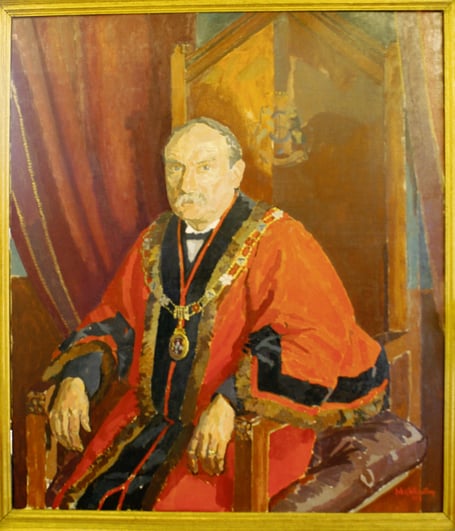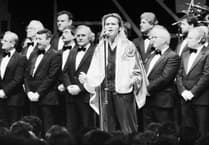AS residents of Abergavenny celebrated news that World War I had come to an end in November 1918, its mayor was facing a battle of his own having been hauled before the town’s police chief after allowing the bells of the area to be rung out in celebration ahead of the official declaration of peace.
The telegram confirming the end of the war was received by Abergavenny’s ‘wartime mayor’ Alderman Zachariah Wheatley, who in accordance with a previous town council decision, allowed the town hall clock to run down so that its chimes struck continuously.
Aware that something momentous was about to happen, crowds began at gather outside the town hall and as the mayor read the telegram people began to cheer for king and country and well known bard and musician John Owen began the singing of the National Anthem.
“In an incredibly short space of time the whole town was gay with flags and bunting. Everywhere people seemed to have become possessed of flags from some source or another and there has not been such a display in Abergavenny since the somewhat momentous days of Mafeking. Hooters were sounded and fog signals were discharged on the railway line during the day,” reported the Chronicle of November 15, 1918.
Amid the celebrations however, there was a reminder of the loss which had been suffered by so many and the Chronicle added that while the whole town was ‘bubbling over with joyousness’ people also remembered that many ‘hearts were sad at having lost those who were near and dear to them’ and that as a result there were no ‘un- seemly scenes’.
“The prevailing note was once of profound thankfulness which was deep in the hearts of all and was reflected in their faces,” reported the Chronicle
At the instigation of the mayor, the town’s businesses agreed to close for the afternoon and acting in direct contradiction of the instructions of the Chief Constable, Alderman Wheatley allowed the bells of St Mary’s to be rung to mark the occasion.
His decision was to bring him into conflict with the powers that be - although utltimately all was forgiven and Alderman Wheatley was Knighted by the King for his wartime service to Abergavenny.
His story was reported in The Abergavenny Chronicle and recreated here...
THE VICTORY BELLS
AN ABERGAVENNY INCIDENT
WHAT THE CHIEF CONSTABLE TOLD THE MAYOR
As recorded elsewhere, when the bells of the town clock were allowed to strike on Monday to signalise the signing of the armistice, the Chief Constable went to see the Mayor at the Town Hall to inform him that, according to instructions received that morning, the bells must not be rung until the sanction of the competent military authority had come to hand. In welcoming the Mayor at the Police Court on Wednesday, Mr. J. O. Marsh referred to the matter. He said he was very glad that morning to find that the Mayor was on that side of the barrier (on the Bench) and not in the defendant’s dock. To his great astonishment on Monday last he heard that he was threatened with prosecution for having allowed the town bells to be rung. He was astonished, and did not believe it. He saw the statement repeated in the papers that it was so and that the Chief Constable had waited on the Mayor and told him that he must not have the bells rung. ‘Still he eould hardly believe it. That morning he had asked the Mayor about it, and he learned that it was indeed so. He was delighted that the Mayor had the courage to have the bells rung. Why in little Abergavenny should they not ring, the bells, when the bells were rung all over the world ? They had heard a great deal of the autocratic government in Germany and they saw the result., He did not think that they were going to have similar autocracy in this country, and he was surprised that greater discretion was not shown by the gentleman he had referred to and that he should attempt to prevent the bells being rung on such a memorable occasion as had not arisen in history before. The Mayor, in replying to the congratulations, said that he regretted very much that unfortunate circumstance which occurred on Monday. The Chief Constable certainly did wait upon him and said that he should have to report him to the military authorities because he had had the bells rung, but at the same time he expressed his regret that he had to do it. They decided to let the bells ring and take the consequences, because they thought the whole country would appreciate the bells being rung on such an occasion as the signing of the armistice in that great European war.
Chief Constable’s Statement.
Interviewed by Press representatives on Wednesday, the Chief Constable made the following statement: “On, Thursday, when the false news came through as to the signing of the armistice, the Mayor telephoned to me for permission to have the bells rung. He admitted that the news was not official, and permission was refused. On Monday morning instructions were received by me from the competent military authorities with regard to ringing of church bells, and these stated that a code word would ‘be telegraphed through when permission might be granted. These had not been received at the time the bells were rung, and I informed the Mayor of these instructions, when he said that these probably referred to the ringing of bells at night. I replied that this might be so, but I would have to report the matter to the military authorities. I found out afterwards that the instructions did refer to night ringing, and nothing further was done. I did not stop the bells being rung. My object was to ensure that there was no premature ringing of bells, as might have happened on the Thursday.”
The Mayor’s Version.
In a statement made to the’ Press in reply to the remarks of the Chief Constable, the Mayor says: “The facts are these. On Thursday I telephoned the Chief Constable, cut of courtesy, and informed him that there was a rumour that the armistice had been signed, “but that it was not official, and I asked him, in the event of an official message coming through, whether it was possible to have the church bells rung. He replied thanking ine for letting him know of the rumour, and said ‘You will be running a great risk if the bells are rung.’ This ended the conversation except that that he asked me that if any news came through to kindly let him know. While speaking at the telephone at the Town Hall on Monday morning, about 12 o’clock, the Chief. Constable came into the Town Clerk’s office and said ‘The church bells must not be rung, for I have had instructions this morning that no bells are to be rung until the competent military authority give permission, and when that is given they may be rung for a week. I have been trying to get hold of the superintendents to tell them, but could not do so, and I have therefore come to tell you personally.’
“I replied, I am sorry, but the bells have been rung, and they will continue to ring until tne thanksgiving service this afternoon, and I must take the con- sequences.”
“He replied, ‘I don’t wish to interfere with your rejoicings, but I have a duty to perform, and I must report you to the com- petent military authority’.”
“I again pointed out to the Chief Constable that I understood that bells and clocks could be rung between sunrise and sunset, but he replied that his instructions were that no bells were to be rung. After the thanksgiving in the afternoon the Chief Constable sent a police officer to my house to inform me that the bells could now be rung. If the Chief did not say they were not to be rung, why did he send an officer to say that they could now be rung ? As regards the Chief’s remark about premature ringing, I don’t know what that means. means.




.jpeg?width=209&height=140&crop=209:145,smart&quality=75)
Comments
This article has no comments yet. Be the first to leave a comment.